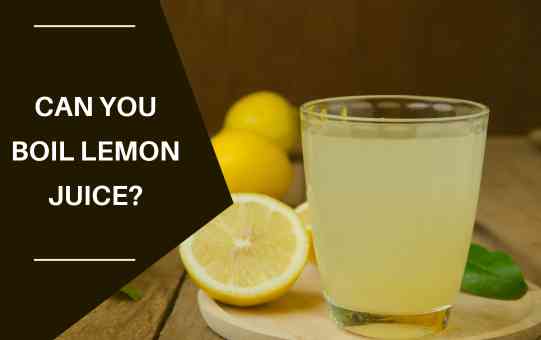Lemon juice, an incredibly versatile component, can enhance a myriad of culinary creations. But can you boil lemon juice? Keep reading to get the best answer to your query.
Can you boil lemon juice? The shortest answer is yes you can boil lemon juice but there are many reasons behind it. In this comprehensive guide, we will explore the process of boiling lemon juice, its effects on flavor and nutrition, storage tips, and creative uses. Let’s dive in!
Contents
Can You Boil Lemon Juice?
Many people wonder if you can boil lemon juice and if you do, if it changes the way it tastes or how healthy it is. Yes, you can boil lemon juice, but it’s important to keep in mind that cooking lemon juice changes both how it tastes and what it contains.
When lemon juice is cooked, it goes through chemical changes that can change how it tastes and how good for you it is.
When you boil lemon juice, some of the volatile chemicals that give it its unique smell and taste evaporate. Because of this, the taste may become less intense and less strong.
Also, the high temperatures that come with cooking can break down some nutrients, like vitamin C, which is sensitive to heat.
Boiling Lemon Juice: What You Need to Know
The concentration of Flavor:
When you boil lemon juice, the taste gets stronger and more sour and acidic. The heat makes the lemon’s natural oils and compounds come out, making the taste stronger. But the level of sourness can be changed to fit individual tastes.
If you want a softer taste, start with a small amount of lemon juice that has been boiled and add more until you get the taste you want.
Nutritional Considerations:
Some vitamins and minerals in lemon juice could be lost when it is boiled because of the heat. But it’s important to remember that even after cooking, most of the nutrients will still be there. Lemon juice is known for having a lot of vitamin C, which can help your defense system and your health in general.
Cloudiness of Boiled Lemon Juice:
Cloudiness is a regular thing that happens when you boil lemon juice. When the juice is cooked, the proteins in it clump together, making it look cloudy.
If you want the lemon juice to be clear, you can strain it through a fine mesh sieve or cheesecloth to eliminate any chunks and make it smoother.

Tips for Boiling Lemon Juice
Here are a few tips to perfectly boil lemon juice:
Selecting and Preparing Lemons:
Choose fresh lemons if you want the best taste and the most nutrients. Look for lemons that are heavy for their size, have smooth skin, and are hard. Before cooking, cut the lemons into fourths and take out the seeds to keep the juice from getting bitter.
Boiling Process:
Over medium heat, bring the lemon juice to a boil in a pot. You can either squeeze fresh lemons to get the juice or use lemon juice from a bottle.
Once the lemon juice has come to a boil, turn down the heat and let it cook for about 10 to 15 minutes. This lets the tastes come together and lets the heat do its thing.
After it has been simmering for a while, take the pot off the heat and let the lemon juice cool completely before putting it in a container with a lid.
Storage and Shelf Life:
Lemon juice that has been boiled can stay in the fridge for up to two weeks. Make sure to store it in a jar that keeps air out to keep it fresh. If you need the lemon juice to last longer, you could freeze it in ice cube trays to make it easy to measure out.

Creative Uses for Boiled Lemon Juice
Some creative used for boiled lemon juice are given below:
Refreshing Drinks:
Add a splash of lemon juice that has been cooked to a glass of water for a drink that is both refreshing and energizing. It’s a good way to stay hydrated and enjoy the sour taste.
Marinades and Dressings:
Lemon juice that has been boiled makes a great marinade for meat or fish. It gives the protein a spicy kick and helps soften it. You can also add it to homemade salad dressings to make your veggies taste better.
Culinary Delights:
Let your creativity soar by using boiled lemon juice in various recipes. It works wonderfully in desserts like lemon curd or lemon bars, providing a bright and citrusy taste that balances sweetness.
Read Also:
Can you add lemon to vanilla cake?
Conclusion:
Boiling lemon juice is not only possible, but it also gives you a lot of ways to add flavor to your cooking. You can make smart choices if you know how boiling affects taste, nutrition, and look. Make sure to use fresh lemons, boil them the right way, and store the boiled lemon juice the right way.
Use boiled lemon juice to make refreshing drinks, marinades, salad dressings, and even sweet treats. Now is the time to dive into the sour world of boiled lemon juice and find out what it can do in the kitchen!
FAQs About Boiling Lemon Juice
Here are some frequently asked questions about boiling lemon juice:
Does boiling lemon juice destroy vitamin C?
Yes, boiling lemon juice can lead to a loss of vitamin C. This essential nutrient is highly sensitive to heat and can degrade when exposed to high temperatures. To preserve the vitamin C content, it’s best to consume lemon juice raw or add it to dishes after cooking.
Can I boil lemon juice for cooking purposes?
While boiling lemon juice might not be ideal for preserving its flavor and nutritional value, you can still use it in cooking. Boiling lemon juice can add a subtle tanginess to sauces, soups, and other dishes. However, keep in mind that prolonged boiling may further reduce its flavor.
What are the potential benefits of boiling lemon juice?
Boiling lemon juice can have some benefits, such as enhancing its shelf life. The heat kills bacteria and other microorganisms that may be present, extending the juice’s freshness. Boiling can also slightly concentrate the flavor of the lemon juice, making it more intense in some cases.
Can I make lemonade with boiled lemon juice?
While it’s not common to make lemonade with boiled lemon juice, it’s technically possible. However, it’s worth noting that the flavor profile and freshness may be compromised compared to using fresh lemon juice. It’s generally recommended to use fresh lemon juice for the best-tasting lemonade.
Does boiling lemon juice affect its acidity?
Boiling lemon juice doesn’t significantly alter its acidity. Lemon juice is naturally acidic due to the presence of citric acid, and boiling it won’t change this characteristic. However, as mentioned earlier, the flavor may become milder due to the loss of volatile compounds.

